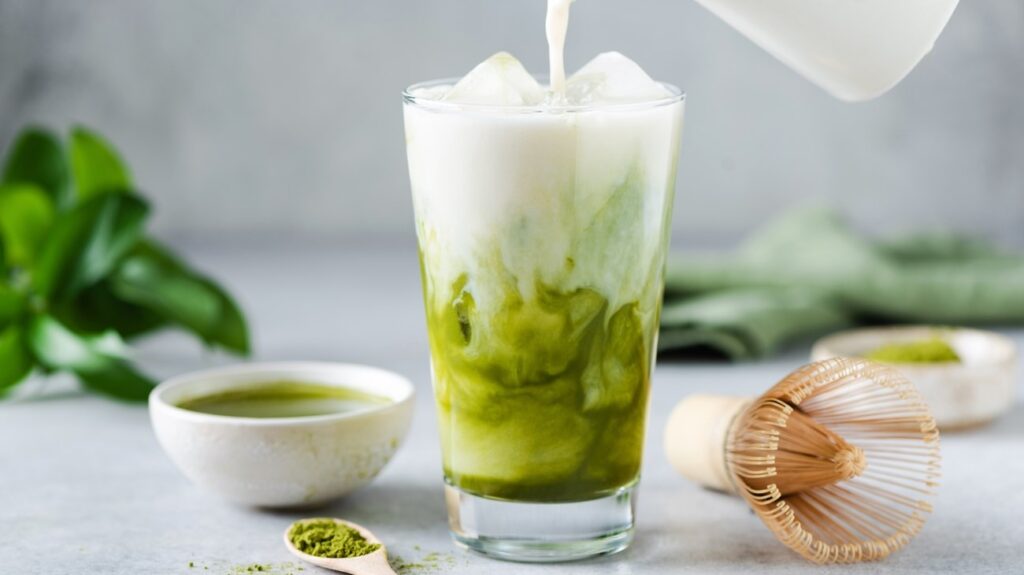
Matcha is a type of dried green tea that has gained popularity in recent years for its potential health benefits. However, when it comes to consuming matcha during pregnancy, there are conflicting opinions about whether matcha is beneficial for pregnant women. Here, we will learn more about the potential health benefits and risks associated with its consumption.
Health benefits of “matcha”:
Matcha is known for its high concentration of antioxidants, which can help protect the body from oxidative stress. These antioxidants, such as catechins, contain anti-inflammatory and anti-cancer properties, and can be beneficial for overall health. In addition, matcha contains the compound L-theanine, which has a calming effect on the mind and can promote relaxation and reduce anxiety. This is especially beneficial for pregnant women who suffer from stress and anxiety during their pregnancy journey. In addition, matcha is rich in vitamins and minerals, such as vitamins C and A, and potassium, which are necessary for the body’s growth and proper functioning.
Below are the health benefits of matcha for pregnant women:
1. Promotes Nutrient Intake:
During pregnancy, it is necessary to eat a balanced diet; To ensure the healthy growth of the child, “matcha” is full of essential nutrients, such as vitamins: (A, C, and E), in addition to iron, calcium, and potassium, so incorporating “matcha” into the diet enables pregnant women to enhance their intake of nutrients and provide their bodies with nutrients. Essential essential for a healthy pregnancy.
2. Provides antioxidant support:
Antioxidants play a vital role in protecting the body from oxidative stress and preventing cell damage, as “matcha” is rich in antioxidants, especially catechins, which have been found to have a protective effect on the body, and pregnant women can benefit from the antioxidant properties of “matcha” by By reducing the risk of chronic diseases and enhancing public health.
3. Supports energy levels:
Matcha contains a moderate amount of caffeine, which provides a natural boost of energy without the negative effects associated with excessive caffeine consumption. Pregnancy often causes women to feel tired and exhausted, so incorporating “matcha” into the routine of pregnant women’s lives enables them to combat fatigue and maintain optimal energy levels throughout the day.
4. Improves digestive health:
Many pregnant women suffer from digestive problems, such as: constipation and bloating, and because “matcha” contains dietary fiber, it helps regulate bowel movements and promote healthy digestion, and thus helps pregnant women relieve common digestive discomforts and maintain a healthy digestive system. .
5. Strengthens immune function:
Having a strong immune system is crucial during pregnancy to protect the mother and developing baby, and matcha is known for its immune-boosting properties, due to its high content of vitamins and antioxidants. Therefore, eating matcha helps pregnant women strengthen their immune system and reduce the risk of infection and disease.
6. Helps relax and reduces stress:
Sometimes, pregnancy is stressful for a woman, both physically and emotionally, and because “matcha” contains an amino acid, “L-theanine,” which has been found to promote relaxation and reduce stress levels, consuming it helps pregnant women feel calm and improve their overall health.
Caffeine content:
One of the concerns related to the consumption of “matcha” during pregnancy is its caffeine content, as “matcha” contains caffeine, albeit in smaller quantities compared to coffee, while moderate caffeine intake is generally considered safe during pregnancy, and excessive caffeine consumption has been linked to increased Risk of miscarriage and premature birth. Therefore, it is important for pregnant women to monitor their intake of caffeine from all sources, including matcha. It is recommended to limit caffeine intake to about 200 mg per day during pregnancy. To reduce potential risks.
Possible risks of eating matcha for pregnant women:
Although matcha is generally safe for consumption, there are some potential risks that pregnant women should be aware of, the most prominent of which are:
The high concentration of antioxidants in matcha may interfere with the body’s ability to absorb iron from plant foods, and iron deficiency during pregnancy can lead to anemia and other complications. Therefore, pregnant women are advised to consume matcha in moderation, and to ensure that their iron needs are met through other food sources.
In addition, some studies indicate that excessive consumption of “matcha” may affect the absorption of folic acid, which is an important nutrient for fetal growth, and pregnant women must ensure that they obtain a sufficient amount of this acid from other sources, such as: leafy vegetables. Green, nutritional supplements, prenatal.
